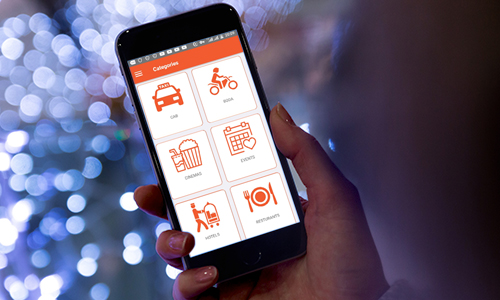Consumers across the world yearn for technologies that make their lives easier. They also want technology solutions that anticipate their needs, reports show.
This is why manufacturers are trying to include as many features as possible in a single item.
Talk of multiple features included in wearables like smartwatches, having a small device controlling most of the activities in an automated home thanks to the Internet of Things etc.
In East Africa, four youthful entrepreneurs are building a product along that line.
Dubbed Orahi – Runyakore for Where are You — the software which was introduced to the market in September of this year is meant to create a link between service providers and consumers.
For users, Orahi Ltd. has developed an application (now only available on Play Store) while service providers have a web-based dashboard that can be operated on a computer. Mobile service providers can also use an app.
Through the app, the founders of Orahi want you to order for food, buy tickets to the nearest cinema and event, book a cab, ambulance, Boda Boda, lodging space and breakdown services.
The company also wants to create a database for you to easily locate office space, co-working spaces, houses for rent, plumbers, delivery services, forex, and banking information, talk to a health expert and report your case to the police station through the app.
The story of founding Orahi
Orahi was founded by Michael Male, Francis Achira, Negus Fatah and Dean Mugisha.
Mugisha and Male first met as students at King’s College Buddo. For ‘A’ Level, Mugisha went to St. Mary’s Kitende while Male stayed at Buddo.
They would reunite at Makerere University where Male studied software engineering and Mugisha pursued a Bachelor of Laws.
While at Makerere, the duo got a chance to participate in the inaugural class of Y Combinator’s Startup School program. It is through this program that they met Fatah and Achira, both Kenyan nationals.
In the course of the program, according to Mugisha, they exchanged ideas and later Fatah came to Uganda and Mugisha also traveled to Kenya “and the rest is history”.
Orahi is operational both in Kenya and Uganda. The basic idea behind Orahi is to have as many service providers as possible integrated into a single application so that a consumer doesn’t have to download different apps for different service providers.
See: New boda boda hailing app wants to dominate sector with futuristic planning
Being a company of 2 months, they haven’t created many partnerships.
In Kampala, they have partnered with Orange Taxi and London Cabs for car taxi transportation, Nawab Restuarant and Kesh Restaurant for food orders, Amari Couriers for deliveries, Urban Listings Kampala and S.T.O Real Estate for those interested in renting houses.
They are also working with Ambulance Africa and Mfeyti Pharmacy.
In Kenya, they have secured more partnerships than in Uganda and they cover most of the categories offered. Some of the partners include Bright Smiles Centre, Kasarani Police Station, TRM Breakdown Services, Kilimani Police Station, Balm Dental Care, Arcade Forex, Prestige Taxi and Boda.
Orahi is still a self-funded company though they have managed to get support from Rotary International which offered them office space.
See: With an eye to the future of digital payments, Xente builds strong foundation
Most of their software development work is done by an Indian company called Actiwate.
Mugisha says they opted for the company after realizing that the best human resource around was too expensive for them.
Being a software developer, Male also tried to mentor some local developers so that they could have an in-house team but the process proved to be impractical, at least at their level of development.
Challenges Orahi faces
As you might have realized already, most of the solutions the Orahi application is offering are already being done by other companies.
For instance, we have SafeBoda, Uber, Taxify, Dial Jack, Quick Taxi among other players offering transport services, there are a couple of fintechs offering ticket booking solutions, bigger companies like Jumia are already in the food and delivery business.
Being a self-funded company trying to establish a footprint in a market crowded with companies that have already won several thousands of dollars in funding, it is going to be really hard for Orahi to compete and gain considerable traction.
See: How Africa is embracing WhatsApp banking
They need immense resources (both in labor and finance) to do this. For instance, one of the first challenges they’ve encountered is recruiting Boda riders to their system.
The companies in the market have already set high standards which a self-funded company can’t easily meet. However, according to Mugisha, they have managed to talk to Opportunity Bank to support them in the process by offering loans to riders to obtain some of the basic requirements.
Their idea is nice from the perspective of reducing the number of apps one would need on their phone to access different services but it will most likely take them a lot of time through creating, destroying and rebuilding to win the market attention.
Related:
In 4 months, how Dial Jack is battling for Kampala ride-hailers
Inside NWSC ICT plan to enhance water service delivery

